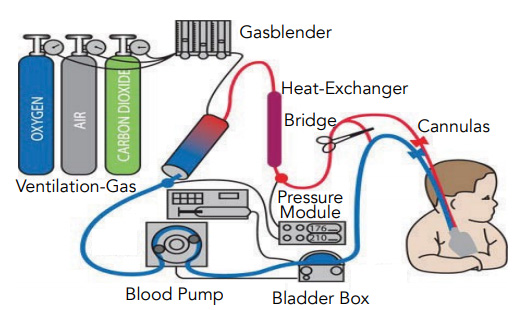Heart and lung bypass care for kids in Las Vegas
Sometimes children with severe lung or heart disorders need additional support, especially after doctors have tried traditional treatments. Extracorporeal membrane oxygenation (ECMO), an advanced technique, provides babies and children with essential life support. Sunrise Children's Hospital has a comprehensive pediatric and neonatal ECMO program treating patients from Las Vegas and the surrounding region.
At Sunrise Children's Hospital, our experienced pediatric specialists employ ECMO to promote natural healing, allowing your child's body and organs to rest while receiving treatment. We communicate and involve you throughout your child's care.
Our facility is Nevada’s only member of the Extracorporeal Life Support Organization (ELSO), the world’s largest directory of ECMO runs and Extracorporeal Life Support centers. ELSO governs and credits ECMO centers around the world.
For more information about our ECMO program, call and speak to a staff member at (702) 961-6450.
Your child's ECMO team
We have a multidisciplinary team coordinating your child's care. Our specialists in neonatal intensive care, pediatric intensive care and cardiology care along with our pediatric team may ask other consulting physicians to be involved in the care plan, including surgeons, neurologists, radiologists, pulmonologist or nephrologists.
Every day your infant will also have a team of specially trained registered nurses (RNs), ECMO perfusionists and respiratory therapists, all guided by our physicians in pediatric care. The ECMO perfusionist monitors the ECMO machine, maintaining a constant presence at your child's bedside.
How ECMO affects your child
If your child is visiting our PICU, then you're familiar with some of the equipment that monitors their health. When ECMO is added to your baby's care, it may be overwhelming. So, we work with you to help you understand this heart-lung bypass technique.
Our doctors have prepared answers to how the machine affects your child, including:
What will my child look like on ECMO?
While on ECMO, your child will continue to need all equipment and machines monitoring their condition in PICU and a few others! Children who are on the ECMO machine will often become 'puffy.'
The puffiness is an expected reaction to the stress their body is under. The swelling can be severe, and your child's appearance may change. As your child's body begins to recover, the swelling gradually resolves.
ECMO requires your child to be on a blood thinner. Due to this blood thinner, there may be blood leaking from your child's mouth, nose, IVs, or chest tube sites. This is common, and the ECMO team is constantly monitoring your infant and doing everything possible to minimize leaks.
Where do tubes connect to my child?
Your child will have two or more plastic tubes called cannulas surgically inserted into large blood vessels. These cannulas are often placed in the neck vessel. Still, they can be inserted into the leg or directly into the heart itself. The cannulas are then connected to the ECMO machine and used to remove and return blood from your child to the machine.
Does ECMO hurt?
When the doctor is placing the cannulas in your child, your child may receive medicine for pain (opioids), for stress (sedatives), and movement (muscle relaxers). The combination of these medications will result in your child being in a deep sleep during this process. The muscle relaxer wears off quickly, so we may need to continue this medication until your child becomes more stable.
ECMO terms to know
When doctors talk to you about adding a heart-lung bypass machine, they may use many unfamiliar terms. Here is an illustration of how the ECMO machine works and a glossary of terms like:
- Oxygenator: The oxygenator gives oxygen to the blood and takes away carbon dioxide from the blood (ventilation gas). The oxygenator is an artificial lung used to do the work of your child’s lungs.
- Heater (heat exchanger): Helps control your child’s temperature while on ECMO.
- ECMO flow: ECMO flow is the amount of blood that is being moved through the machine and oxygenator per minute.
- ECMO pump: The ECMO pump (blood pump) controls how much help is being given to your child. The pump acts like an artificial heart.
- Venoarterial (VA) ECMO: Helps both heart and lungs. One cannula is placed in a large vein and one is placed in a large artery.
- Venovenous (VV) ECMO: Helps the lungs. It usually requires only one cannula placed in a large vein, but sometimes two are needed.
- Trial off: A period of time where the ECMO machine is reduced or stopped to allow testing to be completed to determine if your child is ready to come off ECMO.
- Head ultrasound: A painless study using sound waves to look at brain tissue, we use this to monitor your child for complications of head bleeds while on ECMO.
- ECHO: A painless study like the head ultrasound, using sound waves to look at the heart to see how well the heart is working.
- ACT (activated clotting time): A test that measures how long it takes blood to clot.
- Hemofiltration (bladder box): A filter placed in the ECMO machine that functions as an artificial kidney to help remove extra fluid from your child’s own kidneys.
